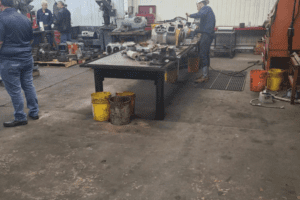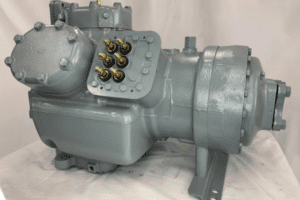Dozens of industries demand reliable cooling. At the heart of those efforts is an industrial compressor – and it often needs to run 24 hours a day, seven days a week. Compressors ensure people can enjoy a blast of cool air when it gets hot, but that’s only the beginning.
Of all the compressors you can choose from, a remanufactured industrial compressor is often the best way to replace your aging compressors at a fraction of the cost. No matter your industry, leaders appreciate the chance to accelerate delivery and simplify their supply chain.
So, which industries are the biggest users of industrial compressors in today’s world? While there are no clear statistics revealing exactly which industry is the big winner, our inside view gives us an idea of which ones ask the most from their compressors.
Let’s visit just a few of the many industries that rely on industrial compressors:
Food and Beverage Processing
America is in the middle of a craft brewing craze, where small independent manufacturers have continued to grow their share of the market as large ones cede some ground. No matter if you’re talking about a tap room with five taps or a 50,000 sqft., facility, compressors are essential. Specialized cooling systems are used for wine, mead, and several other seasonal and luxury beverages, requiring high-performance compressors.
Food Service Warehousing
The further food needs to travel to get to the grocery store – and ultimately to your table – the more chilling needs to be done. Refrigeration begins with the producer and continues during the trek to the product’s point of sale, often using refrigerated trucks known as “reefers.” Depending on the dimensions of the cold storage unit, it may need a powerful industrial compressor equivalent to ten times a residential refrigerator’s power.
Pharmaceuticals
If you think all the way back to the beginning of the pandemic, you might remember that some of the earliest attempts to create protective medical treatments floundered because they needed to be kept so cold, most pharmacies couldn’t meet the demand. Hundreds of other medications also have highly specialized storage requirements, including cooling. In some cases, heat can render them useless in a matter of minutes. This is why this industry relies heavily on industrial refrigeration compressors.
Dairies
The average dairy is anything but average. They need to maintain special cooling systems calibrated for the needs of milk cooling, cheese aging, and ice cream freezing, among many others. None of these different systems are interchangeable, and each one will generally have its own dedicated industrial compressor. Maintaining notoriously strict quality standards, dairies have more cooling per square foot than nearly anyone else.
Meatpacking
Raw meat must be maintained below 40°F, with a common range running between 34F° and 38°F. Producers who are planning to provide meat products to international markets may be held to even tougher standards (such as the United Kingdom standard of 4°C, strictly 39.2°F.) Refrigeration is a core concern within the meat industry from the very moment the product is prepared, and any slip-ups can have major health consequences as well as financial ones.
Fisheries and Seafood
Unlike many other things on this list, quite a few fish can be eaten raw. To be safe for sushi or sashimi, however, they must be frozen almost right away. Seafood processing plants may have advanced cooling systems used to “flash freeze” fish so that they can be frozen only once, immediately after being caught. Freezing prevents the development of bacteria, of course, and it can also contribute to the demise of parasites in the fish.
Energy Industry
Industrial refrigeration – which many include centrifugal compressors that weigh multiple tons – is widely used in the energy industry. Petrochemical and natural gas processing needs compressors to provide process cooling and control chemical reactions. Refrigeration is also being used in novel ways in materials science in an effort to make alternative sources of energy more efficient and affordable.
Plastics
High-quality plastic products often require accelerated cooling. In injection molding and extrusion, the rate of cooling determines many aspects of the final outcome. Industrial compressors are used to cut down on cycle time and accelerate production without compromising on quality. Tensile strength and impact resistance are affected by the cooling rate, so cooling systems must be responsive to the requirements of different products.
Data Centers
New computing applications such as AI are highly energy intensive. Cooling systems must be devised with high demand in mind, dealing with a remarkable amount of waste heat. While IT professionals have long known all about optimizing every square foot of their available space, they now need to understand a thing or two about cooling.
Next time you go out, remember: Whether you notice it or not, an industrial compressor is probably helping out from behind the scenes. Maintain and replace your compressor and it’ll keep you cool when you need it!












